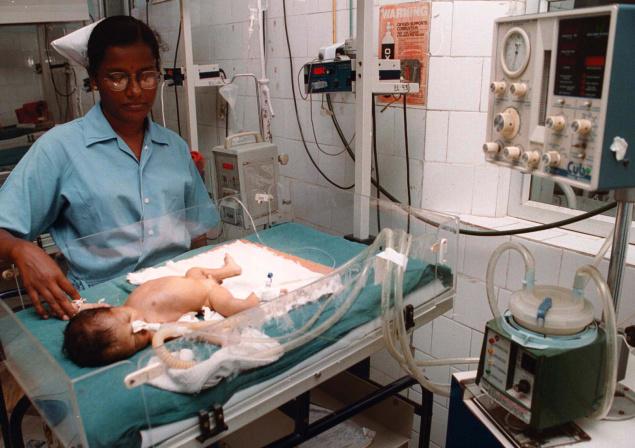 The National Capital had the worst Infant Mortality Rate (IMR) among the four metropolitan cities between 2010 and 2012 with 30 newborns dying for every 1,000 live births, a new report has said. A substantial 64 per cent die within the first 28 days of their birth.
The National Capital had the worst Infant Mortality Rate (IMR) among the four metropolitan cities between 2010 and 2012 with 30 newborns dying for every 1,000 live births, a new report has said. A substantial 64 per cent die within the first 28 days of their birth.
Though the IMR has come down to 25 per 1,000 live births in the past months, the progress in reduction of neo-natal mortality rate (NMR) has been slower, according to ‘Save the Children’ global report ‘Ending newborn deaths, ensuring every baby survives’ that was launched here on Tuesday.
In 2012, three million babies died within the first 28 days of their birth and a million babies died within the first 24 hours of their birth, it says. Comparatively, Chennai recorded the lowest IMR of 15 per 1,000 live births and in Mumbai and Kolkata it was 20 per 1,000 live births.
In respect to Delhi, where 50 percent of the children live in slums and 14.71 per cent of its population is below poverty line — the focus of National Health Mission on maternal and child health, and especially new born by providing adequate number of skilled frontline health workers, building community mechanisms for monitoring and a stronger health system will enable the state to lead on tackling new born child survival, the report points out.
While there has been significant progress on ensuring child survival in India, the fact that nearly 40 per cent of neo-natal deaths occur on the 1st day of birth in India is stalling progress on achieving Millennium Development Goal- 4 (reducing IMR). India accounts for an astounding 29 per cent of the global deaths of newborns on their very first day of birth. About half the first-day deaths around the world could be prevented if every mother and baby had access to free and quality health care and skilled birth attendants.
Considerable progress
“India has made a lot of progress in terms of child survival,” Anuradha Gupta, Additional Secretary, Ministry of Health and Family Welfare said after releasing the report. “But we need to ensure that every child is saved.”“If we want to achieve MDG -4 by 2015, we have to focus on ensuring survival on the first day of birth,” Thomas Chandy, CEO, ‘Save the Children’ said. “Our report reveals the true scale of the newborn crisis. Without targeted action now, progress made in cutting child mortality will stall. If we can eradicate polio, we can also ensure that a child does not die due to preventable reasons,’’ he said.
“With the Call to Action on Child Survival, the Centre has demonstrated a high level of commitment and political will towards ensuring child survival. India has the technical know-how; what is required is a greater urgency to ongoing efforts and focus on the poorest and the most marginalised groups,’’ the report says.

